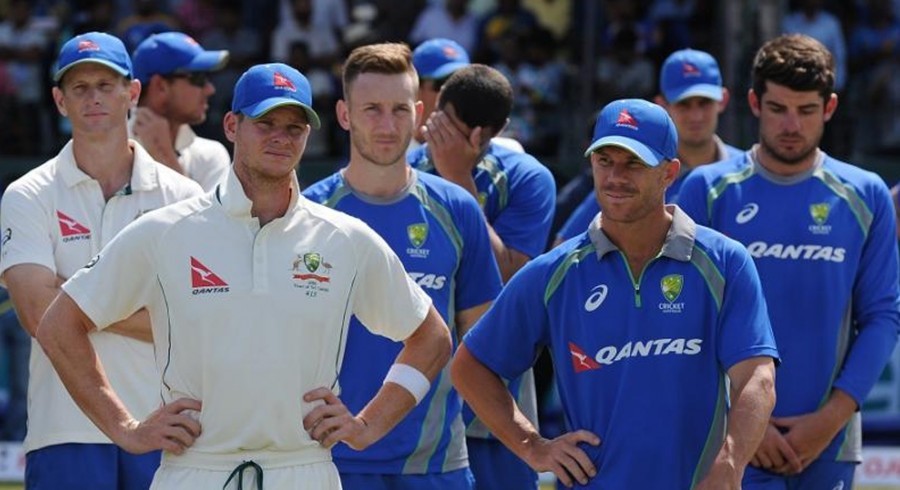PHAgc3R5bGU9Im1hcmdpbi1sZWZ0OjBpbjsgbWFyZ2luLXJpZ2h0OjBpbiI+PHNwYW4gc3R5bGU9ImZvbnQtc2l6ZToxMXB0Ij48c3BhbiBzdHlsZT0iZm9udC1mYW1pbHk6Q2FsaWJyaSxzYW5zLXNlcmlmIj48c3BhbiBzdHlsZT0iZm9udC1mYW1pbHk6TWVycml3ZWF0aGVyIj5UaGUgc2lnaHQgb2YgU3RldmUgU21pdGggYW5kIERhdmlkIFdhcm5lciBmYWNpbmcgYSBwYWNlIGJhcnJhZ2UgaW4gYSBuZXRzIHNlc3Npb24gbGFzdCB3ZWVrIG1heSBoYXZlIGJlZW4gYml0dGVyc3dlZXQgZm9yIGZhbnMgb2YgQXVzdHJhbGlhbiBjcmlja2V0IG51cnNpbmcgZ3JhdmUgY29uY2VybnMgYWJvdXQgdGhlIG5hdGlvbiYjMzk7cyBiYXR0aW5nIGFoZWFkIG9mIHRoZSB1cGNvbWluZyBJbmRpYSBUZXN0IHNlcmllcy4gPC9zcGFuPjwvc3Bhbj48L3NwYW4+PC9wPg0KDQo8cCBzdHlsZT0ibWFyZ2luLWxlZnQ6MGluOyBtYXJnaW4tcmlnaHQ6MGluIj48c3BhbiBzdHlsZT0iZm9udC1zaXplOjExcHQiPjxzcGFuIHN0eWxlPSJmb250LWZhbWlseTpDYWxpYnJpLHNhbnMtc2VyaWYiPjxzcGFuIHN0eWxlPSJmb250LWZhbWlseTpNZXJyaXdlYXRoZXIiPlRha2luZyBndWFyZCBhZ2FpbnN0IHRoZSB0ZWFtJiMzOTtzIGZyb250bGluZSBxdWlja3MsIFNtaXRoIGFuZCBXYXJuZXImIzM5O3MgZWFzeSByZXVuaW9uIHdpdGggdGhlaXIgb2xkIGNvaG9ydCB3aWxsIGhhdmUgZWFzZWQgc29tZSBmZWFycyB0aGF0IHRoZSBkdW8gbWlnaHQgc3RydWdnbGUgdG8gcmVpbnRlZ3JhdGUgYWZ0ZXIgdGhlaXIgbG9uZyBiYW5zIGZvciBiYWxsLXRhbXBlcmluZyBleHBpcmUgYXQgdGhlIGVuZCBvZiBNYXJjaC4gPC9zcGFuPjwvc3Bhbj48L3NwYW4+PC9wPg0KDQo8cCBzdHlsZT0ibWFyZ2luLWxlZnQ6MGluOyBtYXJnaW4tcmlnaHQ6MGluIj48c3BhbiBzdHlsZT0iZm9udC1zaXplOjExcHQiPjxzcGFuIHN0eWxlPSJmb250LWZhbWlseTpDYWxpYnJpLHNhbnMtc2VyaWYiPjxzcGFuIHN0eWxlPSJmb250LWZhbWlseTpNZXJyaXdlYXRoZXIiPkxpdHRsZSBjYW4gYmUgZG9uZSBpbiB0aGUgc2hvcnQgdGVybSwgaG93ZXZlciwgYW5kIGZvcm1lciBjYXB0YWluIFNtaXRoIGFuZCBoaXMgdmljZS0gY2FwdGFpbiBXYXJuZXImIzM5O3MgYWJzZW5jZSB3aWxsIGJlIGZlbHQga2Vlbmx5IGFyb3VuZCB0aGUgY291bnRyeSYjMzk7cyBzdGFkaXVtcyB0aHJvdWdob3V0IHRoZSBzdW1tZXIuIFRoZSBwYWlyIGhhdmUgcGFwZXJlZCBvdmVyIHRoZSBjcmFja3Mgb2YgQXVzdHJhbGlhbiBiYXR0aW5nIGZvciB5ZWFycywgaXNsYW5kcyBvZiBzdGFiaWxpdHkgYW1pZCBjaHVybmluZyBzZWFzLiBTdGF0aXN0aWNhbGx5IHRoZXkgcmVtYWluIHN0YW5kb3V0cywgd2l0aCBTbWl0aCYjMzk7cyBzdHJhdG9zcGhlcmljIGJhdHRpbmcgYXZlcmFnZSBvZiA2MS4zNyBhbmQgV2FybmVyJiMzOTtzIDQ4LjIwIHdlbGwgYWJvdmUgdGhhdCBvZiBudW1iZXIgdGhyZWUgVXNtYW4gS2hhd2FqYSAoNDMuODMpIDwvc3Bhbj4mbWRhc2g7IDxzcGFuIHN0eWxlPSJmb250LWZhbWlseTpNZXJyaXdlYXRoZXIiPnRoZSBjdXJyZW50IHNpZGUmIzM5O3MgbW9zdCBwcm9maWNpZW50IGJhdHNtYW4uIDwvc3Bhbj48L3NwYW4+PC9zcGFuPjwvcD4NCg0KPHAgc3R5bGU9Im1hcmdpbi1sZWZ0OjBpbjsgbWFyZ2luLXJpZ2h0OjBpbiI+PHNwYW4gc3R5bGU9ImZvbnQtc2l6ZToxMXB0Ij48c3BhbiBzdHlsZT0iZm9udC1mYW1pbHk6Q2FsaWJyaSxzYW5zLXNlcmlmIj48c3BhbiBzdHlsZT0iZm9udC1mYW1pbHk6TWVycml3ZWF0aGVyIj5XYXJuZXIgd2FzIGEgcm9jayBhdCB0aGUgdG9wIG9mIHRoZSBvcmRlciBhbmQgbm8gaG9tZSBzdW1tZXIgcGFzc2VkIHdpdGhvdXQgdGhlIHB1Z25hY2lvdXMgbGVmdGhhbmRlciBzbWFzaGluZyBhdCBsZWFzdCBvbmUgY2VudHVyeSBzaW5jZSBoaXMgMjAxMSBkZWJ1dC4gV2hpbGUgaGUgc3RydWdnbGVkIGluIHRoZSBzdWJjb250aW5lbnQsIFdhcm5lciBhdmVyYWdlcyA0OS41MCBhZ2FpbnN0IEluZGlhIGF0IGhvbWUgd2l0aCBmb3VyIGNlbnR1cmllcyBpbiBlaWdodCBtYXRjaGVzLiA8L3NwYW4+PC9zcGFuPjwvc3Bhbj48L3A+DQoNCjxwIHN0eWxlPSJtYXJnaW4tbGVmdDowaW47IG1hcmdpbi1yaWdodDowaW4iPjxzcGFuIHN0eWxlPSJmb250LXNpemU6MTFwdCI+PHNwYW4gc3R5bGU9ImZvbnQtZmFtaWx5OkNhbGlicmksc2Fucy1zZXJpZiI+PHNwYW4gc3R5bGU9ImZvbnQtZmFtaWx5Ok1lcnJpd2VhdGhlciI+U21pdGgmIzM5O3MgYmF0dGluZyByZWFjaGVkIGFub3RoZXIgbGV2ZWwgYWZ0ZXIgc3VjY2VlZGluZyBNaWNoYWVsIENsYXJrZSBhcyBjYXB0YWluIGluIDIwMTUuIEhlIG5vdGNoZWQgaGlzIDIzcmQgdGVzdCBjZW50dXJ5IGFnYWluc3QgRW5nbGFuZCBhdCBsYXN0IHllYXImIzM5O3MgQm94aW5nIERheSBUZXN0IGluIE1lbGJvdXJuZS4gU21pdGggaGFzIGF2ZXJhZ2VkIDg0LjA1IGFnYWluc3QgSW5kaWEgYW5kIGEgd2hvcHBpbmcgMTI4LjE2IG9uIGhvbWUgcGl0Y2hlcywgaW5jbHVkaW5nIGEgY2VudHVyeSBpbiBlYWNoIG9mIHRoZSBmb3VyIFRlc3RzIG9mIHRoZSBsYXN0IDIwMTQtMTUgc2VyaWVzLiA8L3NwYW4+PC9zcGFuPjwvc3Bhbj48L3A+DQoNCjxwIHN0eWxlPSJtYXJnaW4tbGVmdDowaW47IG1hcmdpbi1yaWdodDowaW4iPjxzcGFuIHN0eWxlPSJmb250LXNpemU6MTFwdCI+PHNwYW4gc3R5bGU9ImZvbnQtZmFtaWx5OkNhbGlicmksc2Fucy1zZXJpZiI+PHNwYW4gc3R5bGU9ImZvbnQtZmFtaWx5Ok1lcnJpd2VhdGhlciI+RmluZGluZyByZXBsYWNlbWVudHMgZm9yIHRoZSBkdW8gaGFzIGJlZW4gYSB0aGFua2xlc3MgdGFzayBmb3Igc2VsZWN0b3JzLCB3aG8gd2VyZSBob3BpbmcgY2FuZGlkYXRlcyB3b3VsZCBiZSBiYW5naW5nIGRvd24gdGhlaXIgZG9vcnMgd2l0aCBhIHNsZXcgb2YgcnVucyBpbiB0aGUgU2hlZmZpZWxkIFNoaWVsZC4gPC9zcGFuPjwvc3Bhbj48L3NwYW4+PC9wPg0KDQo8cCBzdHlsZT0ibWFyZ2luLWxlZnQ6MGluOyBtYXJnaW4tcmlnaHQ6MGluIj48c3BhbiBzdHlsZT0iZm9udC1zaXplOjExcHQiPjxzcGFuIHN0eWxlPSJmb250LWZhbWlseTpDYWxpYnJpLHNhbnMtc2VyaWYiPjxzcGFuIHN0eWxlPSJmb250LWZhbWlseTpNZXJyaXdlYXRoZXIiPlRoZSAxNC1tYW4gc3F1YWQgYW5ub3VuY2VkIHR3byB3ZWVrcyBhZ28gd2FzIGRpc21pc3NlZCBieSBsb2NhbCBtZWRpYSBhcyB0aGUgd29yc3QgY29sbGVjdGlvbiBvZiBBdXN0cmFsaWFuIGJhdHNtZW4gaW4gaGlzdG9yeS4gPC9zcGFuPjwvc3Bhbj48L3NwYW4+PC9wPg0KDQo8cCBzdHlsZT0ibWFyZ2luLWxlZnQ6MGluOyBtYXJnaW4tcmlnaHQ6MGluIj48c3BhbiBzdHlsZT0iZm9udC1zaXplOjExcHQiPjxzcGFuIHN0eWxlPSJmb250LWZhbWlseTpDYWxpYnJpLHNhbnMtc2VyaWYiPjxzcGFuIHN0eWxlPSJmb250LWZhbWlseTpNZXJyaXdlYXRoZXIiPkZvciB0aGUgZmlyc3QgaG9tZSBzdW1tZXIgaW4gZGVjYWRlcywgQXVzdHJhbGlhIHdpbGwgbm90IGJlIGxlZCBieSBhIHJ1bi1tYWNoaW5lIGluIHRoZSBtb3VsZCBvZiBTbWl0aCwgQ2xhcmtlIG9yIFJpY2t5IFBvbnRpbmcgYnV0IGJ5IHdpY2tldGtlZXBlciBUaW0gUGFpbmUsIHdobyBoYXMgcGxheWVkIG9ubHkgMTUgcHJldmlvdXMgVGVzdHMuIDwvc3Bhbj48L3NwYW4+PC9zcGFuPjwvcD4NCg0KPHAgc3R5bGU9Im1hcmdpbi1sZWZ0OjBpbjsgbWFyZ2luLXJpZ2h0OjBpbiI+PHNwYW4gc3R5bGU9ImZvbnQtc2l6ZToxMXB0Ij48c3BhbiBzdHlsZT0iZm9udC1mYW1pbHk6Q2FsaWJyaSxzYW5zLXNlcmlmIj48c3BhbiBzdHlsZT0iZm9udC1mYW1pbHk6TWVycml3ZWF0aGVyIj5QYWluZSYjMzk7cyBhdmVyYWdlIG9mIDM4LjI1IGlzIG5vbmV0aGVsZXNzIHN1cGVyaW9yIHRvIHByZWZlcnJlZCBhbGwtcm91bmRlciBhbmQgbGlrZWx5IG51bWJlciBzaXggTWl0Y2hlbGwgTWFyc2gsIG5hbWVkIG9uZSBvZiBBdXN0cmFsaWEmIzM5O3MgdHdvIHZpY2UtY2FwdGFpbnMgaW4gU2VwdGVtYmVyIGRlc3BpdGUgYXZlcmFnaW5nIDI2LjA4IHdpdGggdGhlIGJhdCBpbiBoaXMgMzAgdGVzdHMuIDwvc3Bhbj48L3NwYW4+PC9zcGFuPjwvcD4NCg0KPHAgc3R5bGU9Im1hcmdpbi1sZWZ0OjBpbjsgbWFyZ2luLXJpZ2h0OjBpbiI+PHNwYW4gc3R5bGU9ImZvbnQtc2l6ZToxMXB0Ij48c3BhbiBzdHlsZT0iZm9udC1mYW1pbHk6Q2FsaWJyaSxzYW5zLXNlcmlmIj48c3BhbiBzdHlsZT0iZm9udC1mYW1pbHk6TWVycml3ZWF0aGVyIj5UaGUgcHJvYmxlbXMgYmVnaW4gYXQgdGhlIHRvcCwgaG93ZXZlciwgd2hlcmUgb25lLWRheSBzcGVjaWFsaXN0IEFhcm9uIEZpbmNoIHdpbGwgbGluZSB1cCBmb3IganVzdCBoaXMgdGhpcmQgVGVzdCBhZnRlciBkZWJ1dGluZyBpbiB0aGUgMS0wIHNlcmllcyBkZWZlYXQgdG8gUGFraXN0YW4gaW4gT2N0b2Jlci4gPC9zcGFuPjwvc3Bhbj48L3NwYW4+PC9wPg0KDQo8cCBzdHlsZT0ibWFyZ2luLWxlZnQ6MGluOyBtYXJnaW4tcmlnaHQ6MGluIj48c3BhbiBzdHlsZT0iZm9udC1zaXplOjExcHQiPjxzcGFuIHN0eWxlPSJmb250LWZhbWlseTpDYWxpYnJpLHNhbnMtc2VyaWYiPjxzcGFuIHN0eWxlPSJmb250LWZhbWlseTpNZXJyaXdlYXRoZXIiPkF0IHRoZSBvdGhlciBlbmQgd2lsbCBiZSBhIHJvb2tpZSBpbiBNYXJjdXMgSGFycmlzLCB0aGUgdW5jYXBwZWQgbGVmdC1oYW5kZXIgc2VlbWluZ2x5IHBpY2tlZCBvbiB0aGUgc3RyZW5ndGggb2YgYW4gdW5iZWF0ZW4gMjUwIGZvciBWaWN0b3JpYSBpbiBPY3RvYmVyIHJhdGhlciB0aGFuIGZvciBoaXMgY2FyZWVyIGZpcnN0LWNsYXNzIGF2ZXJhZ2Ugb2YgMzUuNDkuIDwvc3Bhbj48L3NwYW4+PC9zcGFuPjwvcD4NCg0KPHAgc3R5bGU9Im1hcmdpbi1sZWZ0OjBpbjsgbWFyZ2luLXJpZ2h0OjBpbiI+PHNwYW4gc3R5bGU9ImZvbnQtc2l6ZToxMXB0Ij48c3BhbiBzdHlsZT0iZm9udC1mYW1pbHk6Q2FsaWJyaSxzYW5zLXNlcmlmIj48c3BhbiBzdHlsZT0iZm9udC1mYW1pbHk6TWVycml3ZWF0aGVyIj5UaGUgbG90dGVyeSBjb250aW51ZXMgd2l0aCAzNS15ZWFyLW9sZCBudW1iZXIgZm91ciBTaGF1biBNYXJzaCwgd2hvc2UgbGFzdCAxMCBpbm5pbmdzIGF3YXkgdG8gUGFraXN0YW4gYW5kIFNvdXRoIEFmcmljYSBoYXZlIGZlYXR1cmVkIGEgdG9wIHNjb3JlIG9mIDI2LiA8L3NwYW4+PC9zcGFuPjwvc3Bhbj48L3A+DQoNCjxwIHN0eWxlPSJtYXJnaW4tbGVmdDowaW47IG1hcmdpbi1yaWdodDowaW4iPjxzcGFuIHN0eWxlPSJmb250LXNpemU6MTFwdCI+PHNwYW4gc3R5bGU9ImZvbnQtZmFtaWx5OkNhbGlicmksc2Fucy1zZXJpZiI+PHNwYW4gc3R5bGU9ImZvbnQtZmFtaWx5Ok1lcnJpd2VhdGhlciI+VGhlIG51bWJlciBmaXZlIHNsb3Qgd2lsbCBiZSBhIHRvc3MtdXAgYmV0d2VlbiBQZXRlciBIYW5kc2NvbWIsIHdobyB3YXMgZHJvcHBlZCBmb3IgdGhlIFBha2lzdGFuIFRlc3RzLCBhbmQgdHdvLVRlc3QgbGVmdC1oYW5kZXIgVHJhdmlzIEhlYWQsIHdob3NlIGhpZ2ggcmVnYXJkIGZyb20gc2VsZWN0b3JzIG91dHN0cmlwcyBoaXMgaHVtYmxlIG51bWJlcnMgaW4gU2hpZWxkIGNyaWNrZXQuIDwvc3Bhbj48L3NwYW4+PC9zcGFuPjwvcD4NCg0KPHAgc3R5bGU9Im1hcmdpbi1sZWZ0OjBpbjsgbWFyZ2luLXJpZ2h0OjBpbiI+PHNwYW4gc3R5bGU9ImZvbnQtc2l6ZToxMXB0Ij48c3BhbiBzdHlsZT0iZm9udC1mYW1pbHk6Q2FsaWJyaSxzYW5zLXNlcmlmIj48c3BhbiBzdHlsZT0iZm9udC1mYW1pbHk6TWVycml3ZWF0aGVyIj5Gb3IgYSBuYXRpb24gdGhhdCBvbmNlIGJvYXN0ZWQgYSBiYXR0aW5nIHByb2R1Y3Rpb24gbGluZSB0aGUgZW52eSBvZiB0aGUgd29ybGQsIEF1c3RyYWxpYSYjMzk7cyByZWR1Y2VkIGNpcmN1bXN0YW5jZXMgYXJlIGFsbW9zdCB1bmZhdGhvbWFibGUgZm9yIHBhc3QgZ2VuZXJhdGlvbnMuICZxdW90O1NtaXRoIGFuZCBXYXJuZXIgYXJlIHRoZSBvbmx5IHR3byAoYmF0c21lbikgY2FwYWJsZSBvZiBwbGF5aW5nIDEwMCB0ZXN0cyBhYmlsaXR5LXdpc2UsJnF1b3Q7IHNhaWQgZm9ybWVyIHRlc3Qgd2lja2V0a2VlcGVyIGFuZCBzZWxlY3RvciBSb2QgTWFyc2guICZxdW90O1RoYXQgZGlkbiYjMzk7dCB1c2VkIHRvIGJlIHRoZSBjYXNlLiZxdW90OyA8L3NwYW4+PC9zcGFuPjwvc3Bhbj48L3A+DQo=
 PHOTO: AFP
PHOTO: AFP